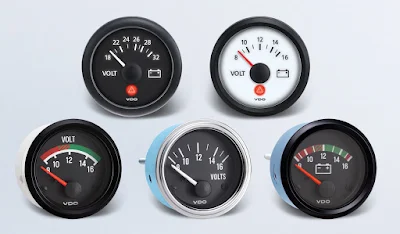The Different Types of Voltmeters Available
Voltmeters are electrical testing tools used to measure the electrical potential difference (voltage) between two points in an electric circuit. They’re used across a wide range of industries, from automotive diagnostics and appliance repairs to industrial installations and electrical engineering.
Selecting the right type of voltmeter for your application is crucial for ensuring accurate readings, reliable performance, and safe operation. In this guide, we’ll outline the most common types of voltmeters to help you make an informed choice for your projects.
Analog Voltmeters
Analog voltmeters display voltage readings using a moving needle over a printed scale. They are traditional meters that operate with a galvanometer mechanism, where the needle’s deflection is proportional to the voltage applied.
Despite becoming less common due to advances in digital technology, analog voltmeters are still valued in specific applications where observing trends or fluctuations in voltage is more useful than pinpoint accuracy. They can display real-time voltage variations more smoothly, which is helpful in diagnosing certain automotive or legacy equipment. However, they are more prone to reading errors caused by parallax or user interpretation.
Digital Voltmeters
The standard for most applications is now digital voltmeters (DVMs) due to their precision and ease of use. They convert the measured voltage into a digital value, usually displayed on an LCD or LED screen.
DVMs eliminate most human error by displaying exact numbers, often with additional features such as auto-ranging and backlighting for use in dark environments. Most DVMs also come with built-in safety features, like non-contact voltage detection and overload protection. Thanks to their reliability and versatility, digital voltmeters are widely used in commercial settings and technical fields.
Portable and Handheld Voltmeters
Portable or handheld voltmeters are compact, battery-powered devices designed for use on the go. They are the most common type found in the toolboxes of electricians, HVAC technicians, and DIY enthusiasts.
These meters can measure not only voltage but also current, resistance, and continuity, often functioning as part of a multimeter. Their portability makes them ideal for fieldwork and troubleshooting in tight or remote locations. High-quality handheld models can offer professional-grade accuracy, especially when regularly calibrated and used with care.
Bench or Laboratory Voltmeters
Bench or laboratory voltmeters are precision instruments used primarily in testing labs, R&D facilities, and electronics manufacturing. They are stationary meters designed for high accuracy and stability over time.
They often include advanced features like programmable input ranges, data logging, and connectivity to computers or measurement systems. While less portable, bench voltmeters are necessary for applications that require exact and repeatable voltage measurements, such as calibrating instruments or developing sensitive electronic components.
